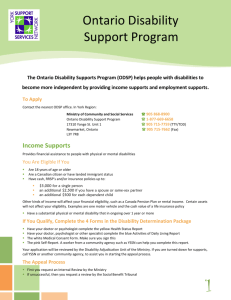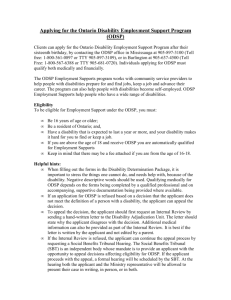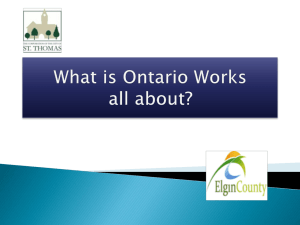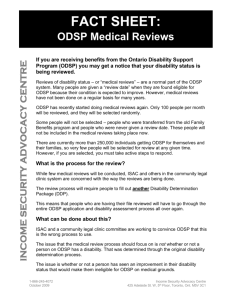Benefits Available to People Receiving Income Support
advertisement
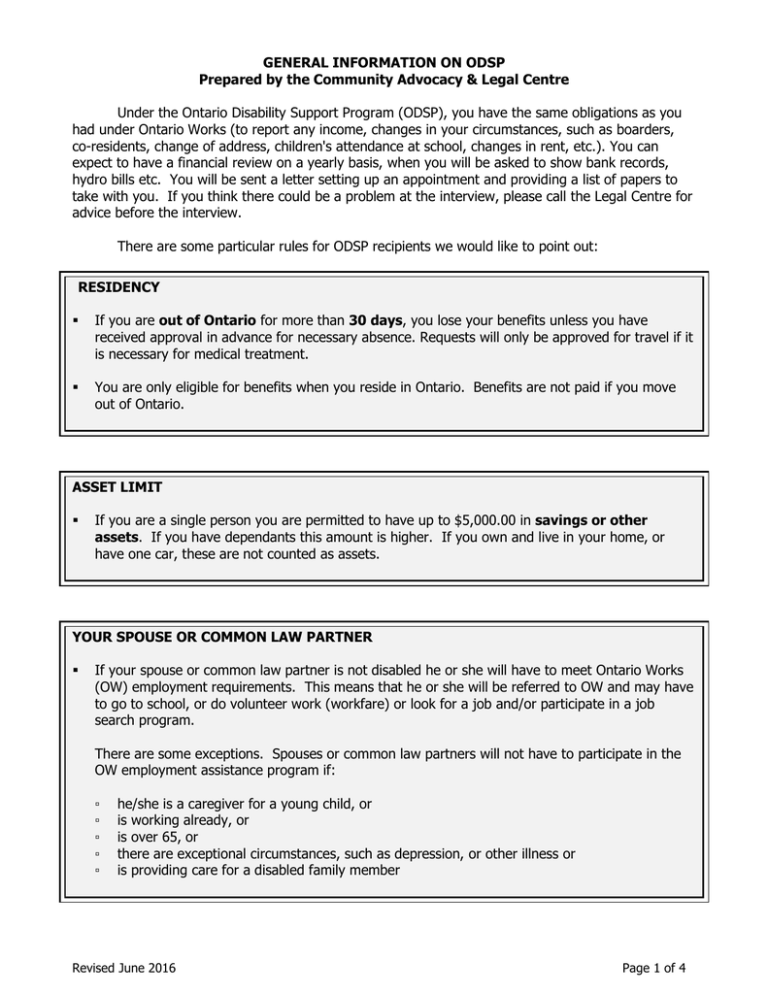
GENERAL INFORMATION ON ODSP Prepared by the Community Advocacy & Legal Centre Under the Ontario Disability Support Program (ODSP), you have the same obligations as you had under Ontario Works (to report any income, changes in your circumstances, such as boarders, co-residents, change of address, children's attendance at school, changes in rent, etc.). You can expect to have a financial review on a yearly basis, when you will be asked to show bank records, hydro bills etc. You will be sent a letter setting up an appointment and providing a list of papers to take with you. If you think there could be a problem at the interview, please call the Legal Centre for advice before the interview. There are some particular rules for ODSP recipients we would like to point out: RESIDENCY If you are out of Ontario for more than 30 days, you lose your benefits unless you have received approval in advance for necessary absence. Requests will only be approved for travel if it is necessary for medical treatment. You are only eligible for benefits when you reside in Ontario. Benefits are not paid if you move out of Ontario. ASSET LIMIT If you are a single person you are permitted to have up to $5,000.00 in savings or other assets. If you have dependants this amount is higher. If you own and live in your home, or have one car, these are not counted as assets. YOUR SPOUSE OR COMMON LAW PARTNER If your spouse or common law partner is not disabled he or she will have to meet Ontario Works (OW) employment requirements. This means that he or she will be referred to OW and may have to go to school, or do volunteer work (workfare) or look for a job and/or participate in a job search program. There are some exceptions. Spouses or common law partners will not have to participate in the OW employment assistance program if: ▫ ▫ ▫ ▫ ▫ he/she is a caregiver for a young child, or is working already, or is over 65, or there are exceptional circumstances, such as depression, or other illness or is providing care for a disabled family member Revised June 2016 Page 1 of 4 INCOME You are also permitted to receive up to $6,000.00 in "gifts or other voluntary payments" in a twelve-month period without any effect on ODSP income or eligibility. You still need to declare this money to ODSP on your monthly reporting form. WORKING You can work (part time, full time, seasonal, permanent or casual) and still receive ODSP. How much of your employment income will be deducted from your ODSP cheque will depend on how much you earn. You will be able to deduct the following amounts from your gross earnings each month: ▫ ▫ ▫ ▫ Mandatory deductions (Income tax, CPP, EI and union dues) $200, plus Up to $600 in “informal child care costs” (i.e. Costs that are paid for babysitting or daycare for which there are no official receipts). Formal child care costs (costs that are documented by a receipt) are fully deductible; plus Up to $300 per month to cover disability related items at work, such as special technology or equipment. Employment income earned by children who are attending secondary school is not deducted. If you earn too much employment income to continue receiving ODSP benefits, then the following will be available to you: ▫ ▫ ▫ You will receive a benefit of $500 to help pay for such things as work uniforms, equipment, and professional fees; If the job doesn’t work out, you will be eligible for “rapid reinstatement” to ODSP. You won’t have to medically prove that you qualify, as long as your ODSP review date has not passed. You may continue to receive your drug card and your ODSP health benefits unless you are covered by your employer. If you are self-employed, these rules may not apply. Contact the Legal Centre for more information. Revised June 2016 Page 2 of 4 BENEFITS AVAILABLE TO PEOPLE RECEIVING INCOME SUPPORT FROM THE ONTARIO DISABILITY SUPPORT PROGRAM ASSISTIVE DEVICES You are eligible for the Assistive Devices Program (ADP), which generally pays for up to 75% of the cost of approved assistive devices. Categories of assisted devices include: wheeled walkers and wheelchairs, visual aids, hearing aids, prosthetic devices, ostomy supplies and respiratory equipment. The Ontario Disability Support Program can help with some of the costs that are not covered by the ADP. The ADP generally does not provide funding for batteries or repairs. The Ontario Disability Support Program can help with the cost of batteries or repairs for hearing aids and mobility devices, like an electric wheelchair. The ADP will not reimburse you for devices you buy before getting approval. To get ADP funding, you need to get approval first from a physician or qualified professional who is registered with the ADP. Usually, the physician or qualified professional also assesses your needs and prescribes the device or supplies. DRUG COSTS & DENTAL/VISION BENEFITS If you are not on Ontario Works when you start to get ODSP benefits, you can ask to be reimbursed for your drug costs during the period that you waited for ODSP benefits. Ask your drug store to give you a list of the drugs you got during this period of time and their cost. Give this to ODSP and ask them to reimburse you. Call us if they refuse to reimburse you. You, your spouse and dependent children under 18 years of age are eligible for basic dental care from a dentist, with an ODSP dental card, which will be mailed to you each month. You may also qualify for additional services if your disability, prescribed medications or prescribed treatment affects your oral health. You and your dependants are eligible for part of the cost of prescription glasses. Routine eye exams are covered once every 24 months for members of the benefit unit, including dependent adults (those over 18 years of age). You may be eligible for part of the cost of contact lenses ONLY when medically necessary. MANDATORY SPECIAL NECESSITIES You and your dependants are eligible for Mandatory Special Necessities such as diabetic supplies, surgical supplies and dressings. Revised June 2016 Page 3 of 4 TRANSPORTATION COSTS You are eligible for the cost of medical transportation to meet with your health care provider. You are eligible to be reimbursed for the actual cost of the transportation i.e. - bus ticket, taxi - if no public transportation is available. You are paid 18¢ a kilometer for mileage. You need to keep all of the receipts and submit them to the ODSP office. Transportation costs to attend mental health counselling are covered if the treatment is prescribed by a doctor, psychiatrist or psychologist. If ODSP refuses to pay medical transportation, including costs for counselling, call us for help. SPECIAL DIET NEEDS If you have a medical condition requiring a special diet you may be entitled to extra money from ODSP. A form must be completed by a health care provider. You may apply for this benefit for any person in your family with special dietary needs. Examples of medical conditions are diabetes, food allergies to wheat or milk and osteoporosis. *If you are denied any of the above benefits you should contact the Ministry and ask for a written letter explaining why your benefits were denied, and contact the Community Advocacy & Legal Centre for more information about how to appeal. If you want to dispute the denial of benefits you must do so within 30 days from the day you received notice that your benefits were being reduced. It is very important that you contact our office immediately. For more information, visit the Community Advocacy & Legal Centre (CALC) website at http://www.communitylegalcentre.ca/. To read the Ministry of Community and Social Services policies on the issues outlined in this tip sheet, visit their website at http://www.mcss.gov.on.ca/en/mcss/programs/social/directives/index.aspx. The Community Advocacy & Legal Centre has many legal pamphlets available in its waiting room to provide you with more information on ODSP produced by Community Legal Education Ontario (CLEO). To order free publications visit their web site at www.cleo.on.ca. This information is not meant to be legal advice. If you have a legal problem you should contact the Legal Centre. Revised June 2016 Page 4 of 4
